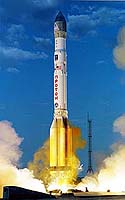| . |  |
. |
Baikonur - Nov. 26, 2002 A major satellite aiming to transmit television programs and Internet into homes across Europe failed to reach orbit after its launch from Kazakhstan early Tuesday, the manufacturer said, calling the huge commercial venture into question. "We have established control over the satellite, the solar panels have been partly deployed and the satellite is doing fine," a spokesman for Alcatel Space said, denying media reports that quoted Russian space officials as saying the satellite had officially been classified as lost. "The satellite is not lost, but can it function?" asked Konstantin Kreidenko, spokesman for Russian aerospace agency Rosavyakosmos. The Astra 1K satellite was the largest civil telecoms satellite ever launched and was intended to relay television programs, Internet data and mobile telephone communications to the whole of Europe, Alcatel Space said. It reached basic orbit minutes after blasting off from Kazakhstan's Baikonur cosmodrome at 4:04 am (2304 GMT Monday) but failed to make any progress to its ultimate orbit 36,000 kilometres (22,370 miles) from the earth, Russian space officials said. It is now hovering just 200 kilometres from the earth and experts said it was theoretically possible to use the satellite's own propellers to boost it into orbit. But that would require an increased use of fuel, which could reduce the satellite's expected lifespan of 13 years, they said. And it all depends on where the satellite is floating. A similar tactic was successfully used to rescue a troubled Artemis satellite in July last year, but it was floating 17,000 kilometres high. The Astra 1K failed to reach orbit due to a malfunctioning accelerator, Russian aerospace spokesman Kreidenko said, adding that the rocket launcher was not to blame. "An investigative commission will be created within the next 24 hours to figure out the exact causes of the failure," Kreidenko said. Len Denst, vice president of Russian-US joint venture International Launch Services (ILS), which owns the Proton launcher, said the satellite failed to reach orbit after ejecting prematurely from the rocket and "is at too low of an orbit." ILS said it was also opening an investigation into the malfunction. The satellite was the first project designed by Alcatel for SES Astra, part of Luxembourg-based world satellite operator SES Global, whose 29 satellites transmit more than 1,100 television and radio channels, as well as Internet and multimedia, around the world. The project cost SES Astra some 280 million dollars (euros), SES Global's financial director Juergen Schulte said. "The priority was to safeguard it," Patrick Fournie, director of telecommunications at Alcatel Space, told AFP. "We are trying to map out the best strategy to propose to clients of SES Astra who will then decide (what to do)," he added. The Astra 1K, with its 37-metre (122-foot) wingspan and measuring 6.6 metres in height, is equipped with 10 orientation antennae. Due to its unusually large size, it may replace the three Astra satellites already in orbit and serve as back-up for four others. "It's really too bad that after 13 Astra launches with no problems, we finish up with what may prove to be our first failure," SES Astra spokesman Yves Feltes said. Tuesday's launch was was the 14th and final launch of the Astra series. It was the sixth of an Astra satellite aboard a Proton rocket, owned by ILS, a joint venture of US-based Lockheed Martin and Russia's Khrunichev and RKK Energiya. Related Links SpaceDaily Search SpaceDaily Subscribe To SpaceDaily Express
 Baikonur - Nov. 26, 2002
Baikonur - Nov. 26, 2002International Launch Services regrets the failure of today's mission to put the ASTRA 1K satellite into proper orbit for SES-ASTRA. |
|
| The content herein, unless otherwise known to be public domain, are Copyright 1995-2006 - SpaceDaily.AFP and UPI Wire Stories are copyright Agence France-Presse and United Press International. ESA PortalReports are copyright European Space Agency. All NASA sourced material is public domain. Additionalcopyrights may apply in whole or part to other bona fide parties. Advertising does not imply endorsement,agreement or approval of any opinions, statements or information provided by SpaceDaily on any Web page published or hosted by SpaceDaily. Privacy Statement |